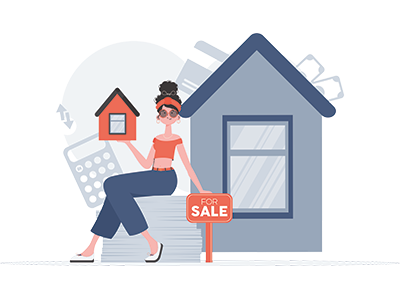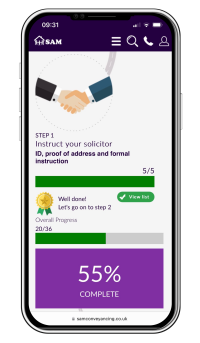Can You Do Your Own Conveyancing?
- You can do your own conveyancing if it is a cash transaction (without a mortgage or loan). However there are many risks involved in undertaking the legal transfer yourself.
- For most sales, purchases, transfers of equity, and remortgages, you will have to use a conveyancer or solicitor.
- Even in the few scenarios where a solicitor isn't strictly required, the skills of an experienced conveyancing solicitor will be worth the cost.
What is conveyancing?
Conveyancing is the legal transfer of a property from one owner to another. The process normally begins with instructing your conveyancing solicitor to start the process just after your offer has been accepted, or if you’re the seller, when you’ve accepted the offer.
Conveyancing also refers to a transfer of equity when adding or removing someone from the title and remortgaging from one lender to another.
There is a multi-part process that must be carried out before you can get the keys to your new place. The conveyancing journey concludes when you have paid for the property and any stamp duty liability, and register the new ownership with the Land Registry.
But can you do your own conveyancing? This article covers the conveyancing process, how long it takes, and how much it costs.
Can an individual do their own conveyancing?
You can do your own conveyancing if it's a cash transaction without a mortgage unless the other party has a solicitor who won't deal with you directly. However, it is highly advised against due to the sheer number of risks involved. Not only will you likely increase the process time, but any mistake can lead to expensive consequences.
Here are some of the huge caveats to doing your own conveyancing:
- Inexperience in conveyancing can drastically delay the process, as opposed to a conveyancing solicitor who might take only eight weeks.
- Conveyancing solicitors have standardised documents, including legal enquiries and contracts of sale which can easily be adapted and checked against each transaction. Drafting these yourself without legal training is stressful, time consuming, and open to significant flaws.
- A mistake can be costly. However, property lawyers are protected by professional indemnity insurance which would pay out if their mistake costs you money.
- The other party's solicitor may refuse to proceed when you're doing your own conveyancing.
- Conveyancing solicitors hold your money in a client account and carry out money laundering checks to ensure the source of funds is legitimate. The other party's solicitor may refuse to accept funds from your own account.
- An undertaking is a solicitor’s given promise that they will carry out a specific task or not. This is enforceable by the court. Failure to carry out an undertaking by a competent professional would result in professional misconduct, leading to disciplinary action by the SRA for a breach. Because you’re a private individual, you cannot give a relied upon undertaking. The other party would consider you to be high risk.
What is the Conveyancing Process?
- 1Instruct your Solicitor/Licensed Conveyancer
- 2Mortgage and Funding (including gifts)
- 3Home Buyers Survey
- 4Conveyancing Searches
- 5Contracts and Enquiries
- 6Exchange of Contracts
- 7Completion
- 8Post-completion
How long does the Conveyancing Process take?
The conveyancing process time will vary depending on whether it’s a freehold, a leasehold, or you’re purchasing a property through the shared ownership scheme.
The time scale can slide due to several potential delays; defects discovered in a property survey require negotiation, the other party not having paperwork ready, delays further up or down the chain, local authority delays in returning searches, inefficient solicitors, or a change in circumstances affecting mortgage approval.
Freehold: 8 to 10 weeks
If it’s a freehold, the time is shorter at 8 to 10 weeks.
Leasehold: 10 to 12 weeks
If it’s a leasehold, conveyancing will typically take between 10 and 12 weeks. The process for a leasehold is longer because you are dealing with more complicated legal work and dealing with a landlord or third-party management.Shared ownership: 10 to 12 weeks
The shared ownership scheme also has a lengthy conveyancing process at 10 to 12 weeks. This is because of the additional step of agreeing on the lease purchase agreement with the housing association.
Conveyancing can be done more quickly if there is no mortgage work to complete, no capital gains or stamp duty tax to consider, and in cases where no consideration is paid for example a transfer of equity. Auctions have fast tracked processes usually set at 28 days.
- online checklists
- videos
- free downloads
- useful tips
How much does conveyancing cost?
If you decide to hire a conveyancer, conveyancing costs differ from firm to firm; some estimate and charge ‘on the clock’ while others offer a fixed fee. With the firm dependency, you can expect anything between £500 and £2000 for a single conveyancing.
Typically, you’ll pay more for a leasehold than for a freehold conveyancing. This is due to a third party being involved in the leasehold seller. And lastly, buying a property with a mortgage is also going to increase the costs.
Why is the Conveyancing Process so complicated?
The conveyancing process can be daunting, given there are many moving parts and a lengthy time and financial commitment. With there being multiple people involved, it's understandable why purchasing a property can be a stressful experience.
So let's consider what is involved to understand why the process is complicated:
- What's being bought/sold is comparatively expensive
For many, buying a property is the most expensive purchase they’ll make. You’ll want to get experts to check out your potential purchase as much as possible. This is to ensure the property is fit-for-purpose. If you’re the seller, you’ll need assurances that the buyer has the funds to buy your property. - There may be several different professionals involved
A lawyer is needed to handle the legal aspects of your home purchase or sale. If you’re the seller, and it’s a freehold, you’ll need to keep your freeholder informed. For the buyer, you may want to get a surveyor to inspect the property. This is to expose any hidden issues that could save you a lot of money in the future.
A lender's valuation is required if you’re buying with a mortgage. This is carried out by another surveyor. These professionals listed must be accredited and may need to communicate with one another. - There are all sorts of legal issues involved
Title deeds, complicated contracts, exchanging large amounts of money, and planning permissions are part of the many tasks a solicitor must get through. They'll need to gather all the documents they require and have time to absorb all the details.
- Fixed, competitive legal fees with no hidden costs.
- Expert conveyancing solicitors with proven local knowledge.
- No Sale, No Fee protection for your transaction. Terms apply.
- On 99% of mortgage lender panels.
- Fast completions.
- We can solve any property challenge.
Andrew started his career in 2000 working within conveyancing solicitor firms and grew hands-on knowledge of a wide variety of conveyancing challenges and solutions. After helping in excess of 50,000 clients in his career, he uses all this experience within his article writing for SAM, mainstream media and his self published book How to Buy a House Without Killing Anyone.
Caragh is an excellent writer and copy editor of books, news articles and editorials. She has written extensively for SAM for a variety of conveyancing, survey, property law and mortgage-related articles.











